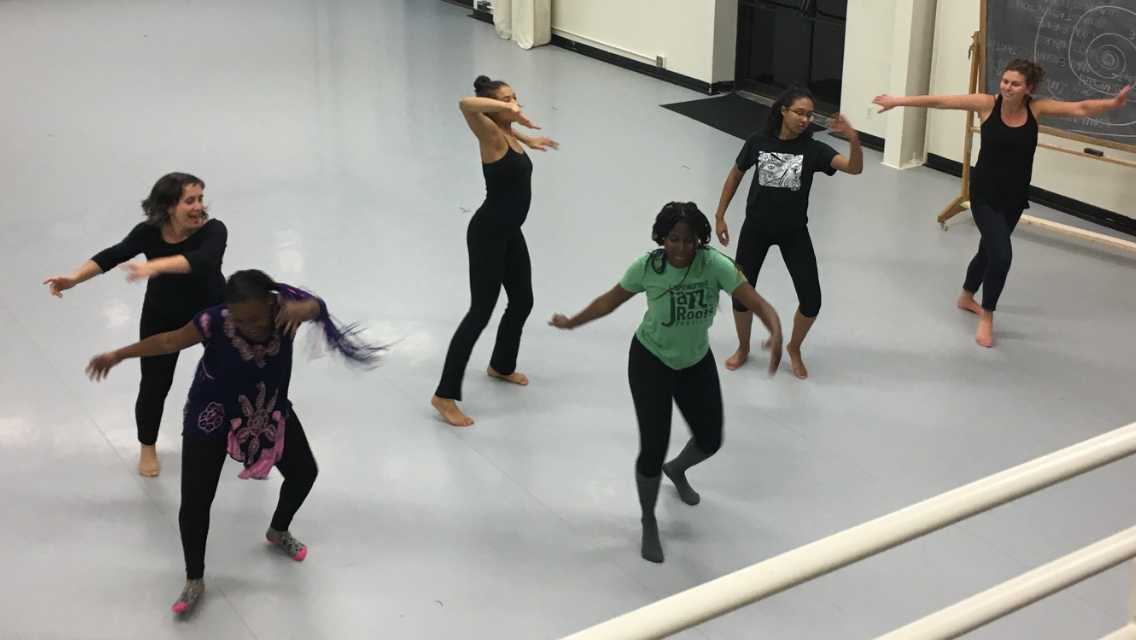A lyric essay by Jamila Jackson
I have spent the last few years at Hampshire developing the Embodied Leadership Project. My intention with the project has been to facilitate experiential learning around the topics of empathy and emotional intelligence. I understand both of these things to be embodied and relational skills. Advocating within academia for a learning style that centers embodiment and relationship is a challenging and creative process. I have found a deep resource of support for this process at Hampshire.
I have been privileged to get to work with, and be supported by, the Ethics and the Common Good Project for the past three years. Their relational leadership model has greatly influenced my work and my research. I am specifically interested in the storytelling method that they offer through their partnership with Relational Uprising. This method crafts stories around supports, values, and challenges in a way that brings marginalized aspects of our narrative to the forefront. Each story is then told within a present-moment practice of resonant empathic response. My experience with this has been deeply transformational, especially in centering voices within my narrative that are usually silenced.
My collaborator Narieka Masla and I are currently launching The Young Women’s Embodied Leadership Program to support undergraduate women of color in STEM+Arts & Design in developing their leadership and empathy skills. This upcoming year I will also begin the two year process of getting my Masters of Fine Arts degree. In both of these endeavors, I am looking forward to continuing the process of building curriculum that supports cultivating containers for feeling and emotion.
Many of the themes found in the following lyric essay come from the intersection of my artistic research in authentic movement (a contemplative movement practice rooted in Car Jung’s active imagination work) and storytelling. In this piece I am exploring the idea of the commons as the collective unconscious and ethics as body-inclusive communication.
Silence, Breath, and Empathy
I am interested in an ethics,
and a perspective of the commons,
that not only takes into account those narratives, bodies, and relationships
that have been silenced and made invisible,
but curates and remembers a language that includes and relates to these
phenomena,
allowing for their expression and unfoldment
as a sacred occurrence
within a listening
whole
Silence & Language
1.
In western culture, the primary site of silence and invisibility is the body.
And it is the body who communicates.
Through our bodies we feel
rhythm,
and rhythm is life,
is
vibration, is matter, is thought-wave
is
light, is heartbeat, and the tide.
Rhythm is
the manifest and unmanifest universe.
Polyrhythm
is a word that honors the patterned/
relational/
felt/
embodied
language of earth.
2.
The transforming and ever unfolding earth,
her children, her allies,
and her ancestors
are feeling bodies.
Their relationship is their resource.
Their relations are:
the
commons.
We.
3.
A fear and hatred of feeling perpetuates the shaming and erasure of, and direct violence
toward,
the body:
the site of feeling,
and vice versa.
To stop feeling interrupts relationships capacity to be a resource.
This is the breeding ground for
a culture of white supremacy, patriarchy, colonization.
Culture without Breath
4.
Out of this culture,
our language, our analytical processes, our cognitive practices, our learning, our
relationships, and our meaning making
are born,
born with an inherent
design to suppress feeling and deny the body at all costs.
This is a lineage of extreme cognitive dissonance:
a perception and way of being that is in direct contradiction with our breath,
our body.
The trauma is breathtaking. Our breath is taken,
we literally forget our connection to self, community & earth.
We becomes I.
I becomes sick.
Connection becomes dissonant, relationships become sites of harm,
domination becomes automatic.
5.
So I believe that an inclusive ethics requires a cognition
that honors support for the breath.
A cognition
that is rooted within the body and its many forgotten realms.
The body: gateway to
the unknown, yet living, Real,
an interconnected fabric of unexpressed feeling, encoded like coiled ferns,
within
the rhythmic
unconscious.
The unconscious:
The locations of
the emotional and sensory shadows cast
by the phenomenon of
relationship.
The web of nature. A vault of living stories.
Empathy
6.
bell hooks says,
“To call attention to the body is to betray the legacy of repression and denial that has been
handed down to us by our professorial elders, who have been usually white and male.”
7.
When we remember the body, we will come up against a resource of feeling that may at first feel too overwhelming to tolerate because we have been conditioned into numbness,
desensitized.
It will probably burn like fire, to remember how to feel, like the thawing of a frozen limb. We will probably do anything and everything to avoid it.
So how do we touch these places like a midwife? Skilled and powerful? Standing at the gateway, supported by the medicine of the earth, how do we be with feeling as it moves through the body?
In relationship to one another and to our planet, our ability to tune in and connect
is a sweet and nothing nectar for the burning flames of remembering sensation: empathy.
Cultivating this ability is the community research I engage in through my work and artistic practice.
Jamila Jackson is an artist, facilitator, and scholar who uses embodiment, storytelling, and contemplative practices to build community and cultivate leadership development and empathy skills. Originally from the Bay Area, California, she attended Howard University for two years and received her B.A. from Hampshire College. Her background in dance, cultural & community expressive arts, and emotional and trauma release work has helped to shape the leadership model she offers through her work. You can learn more at https://sites.hampshire.edu/elp


